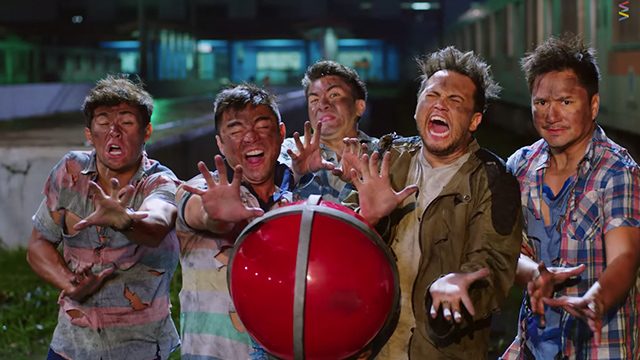SUMMARY
This is AI generated summarization, which may have errors. For context, always refer to the full article.

Let us do away with the obvious. Wenn Deramas’ Moron 5.2: The Transformation is a bad film.
It is bad not because it is senseless or inutile. It is bad because it is a shallow product, a lamentable attempt to pander to its bafflingly easy-to-please market without even a slight effort to innovate or to contribute to its audience’s growth. It’s just there to squeeze a little bit more money out of what is currently regarded as funny.
A sequel to Moron 5 and the Crying Lady (2012), Moron 5.2 just repeats a lot of the humor of its predecessor. The movie’s a numbing mix of slapstick, crude jokes, and convenient punchlines. The movie relies on stupidity, not only of the five main characters but of almost everyone else, to draw out laughter.
The story so far
The five titular morons (played by Luis Manzano, Billy Crawford, Marvin Agustin, DJ Durano, and Matteo Guidicelli) are now married, and have ironically fathered geniuses. In an effort to make their children proud of them despite their obvious lack of intellect, they start to dress up as superheroes, believing that the blinking debris that fell from a distressed plane is an alien artifact that would grant them powers.

Meanwhile, Beki (played by John “Sweet” Lapus), who has been struggling inside a mental hospital because of the five’s doing, has gotten word about the new superheroes and now desires the powers for himself. He escapes from the hospital and hatches a plan to steal the power source.
The plot is of course merely secondary to all the nonsense. It is nothing more than a framing device to hold all the jokes, egotistic references, and insensitive antics together.
The forgettable five
Even the characters are treated as shells, with the movie repeatedly referencing the actors playing them, not in a way that is intriguing or innovative in a metacinematic sense but in complete surrender to the fact that the celebrities are bigger than the roles they are portraying.

Characterization, again, is subservient to the film’s shenanigans. There is simply no effort to separate the characters from the celebrities that play them. Predictably, the bigger celebrities with the more recognizable offscreen stories turn out to be more memorable, turning the moron played by Durano, who is arguably the least recognizable celebrity out of the five, into a wallflower in a party where he seems totally out of place.
A lot of the jokes are based on the experiences of the actors playing the characters. This gets really repetitive, signaling laziness on the part of Deramas to come up with jokes that don’t rely on his audience’s familiarity with the faces onscreen.

Humor out of horrors
The most troubling thing about Moron 5.2: The Transformation is not that it is bad, but that this is rewarded with viewership which has eluded a lot of other local films. The humor it delivers is not fresh but it is still being eaten up by the public as if it were prime meat being sold at affordable prices.
The same way it mines jokes out of its actors’ many real life tragedies, the movie also utilizes horrific situations, such as a hijacker wanting to blow up an airplane or a hostage crisis, for jokes.
This kind of brazenness is not necessarily a bad thing despite the outright insensitivity if there is more to that kind of humor than just the mindless and somewhat mean-spirited laughs it elicits.
However, Moron 5.2: The Transformation clearly only exists for momentary escapism and the profit such escapism may earn for the film’s producers, nothing more. It does not earn its careless callousness, since its very few attempts at authentic satire are drowned by the blatant idiocy the movie celebrates with such hollow crassness. – Rappler.com
 Francis Joseph Cruz litigates for a living and writes about cinema for fun. The first Filipino movie he saw in the theaters was Carlo J. Caparas’ ‘Tirad Pass.’ Since then, he’s been on a mission to find better memories with Philippine cinema.
Francis Joseph Cruz litigates for a living and writes about cinema for fun. The first Filipino movie he saw in the theaters was Carlo J. Caparas’ ‘Tirad Pass.’ Since then, he’s been on a mission to find better memories with Philippine cinema.
Add a comment
How does this make you feel?
There are no comments yet. Add your comment to start the conversation.